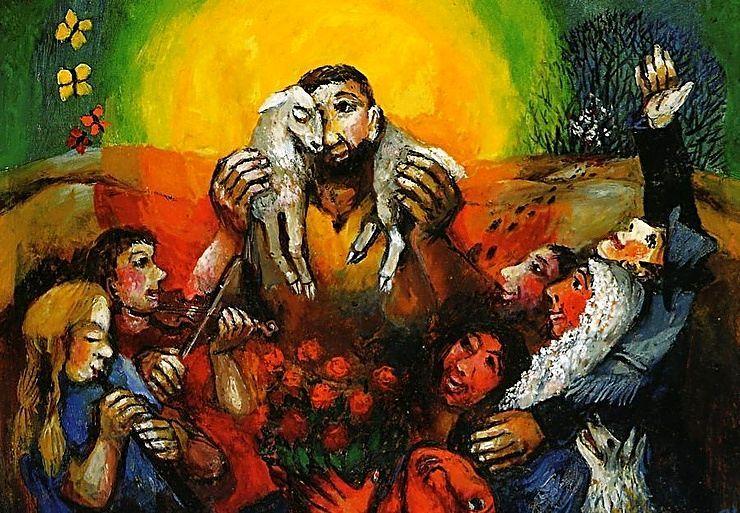Daniel Comboni
Comboni Missionaries
Institutional area
Other links
Newsletter
Tuesday, June 13, 2023
We are sharing this pamphlet as a supplement to help us live more deeply the upcoming Solemnity of the Sacred Heart of Jesus (16 June), accepting the invitation extended to us by the XIX General Chapter: to deepen and assume our spirituality which is marked by some specific elements that make up our identity as Comboni Missionaries of the Heart of Jesus.
Towards the Solemnity of the Heart of Jesus
16th June 2023
Introduction
We are sharing this pamphlet as a supplement to help us live more deeply the upcoming Solemnity of the Sacred Heart of Jesus (16 June), accepting the invitation extended to us by the XIX General Chapter: to deepen and assume our spirituality which is marked by some specific elements that make up our identity as Comboni Missionaries of the Heart of Jesus.
We ask the confreres of all communities to study it and discover the best way to prepare for the solemnity: we may opt for a day of retreat or a series of meetings for prayers and/or sharing…
The basic text that must guide our reflection is in No. 3 of the Rule of Life:
The Founder discovered in the mystery of the Heart of Jesus the thrust of his missionary commitment. Comboni’s unconditional love for the peoples of Africa had its origins and model in the saving love of the Good Shepherd who offered his life on the Cross for humanity: «Trusting in that most Sacred Heart … I feel more inclined to suffer … and to die for Jesus Christ and for the salvation of the unhappy peoples of Central Africa » (Writings, 4290).
And these are the words of the XIX General Chapter in this regard:
12. We dream of a spirituality that enables us to continue to grow as a fraternal family of consecrated persons rooted in Jesus, in his Word and in his Heart, and to contemplate him in the faces of the poor and in the experience lived by St. Daniel Comboni to be the mission.
14.3 We wish to raise our awareness of the fundamental aspects of the charism (e.g., the Cross, the Heart of Jesus, the option for the poorest and most abandoned) through Comboni’s vision, spirit and sensitivity to go to the roots of his spirituality and reappropriate it.
We may see our missionary life as a “journey” that starts in the Heart of Jesus and reaches our hearts, eventually reaching the hearts of the persons with whom we share both history and destiny. To be – or rather to become – “Consecrated people rooted in Jesus, in his Heart” means becoming what we are, to realise, for example, the identity we receive from the Lord, thanks to St. Daniel Comboni. Comboni Missionaries of the Heart of Jesus is our name.
At the end of the booklet of our Rule of Life there is a Letter Concerning the Name of the Institute, specifying what inspired the new choice of 1979. It is useful to re-read and meditate on this text, as a first moment of study.
Our Rule of Life, No. 3 offers us the experience of Comboni: his missionary commitment and his unconditional love for the peoples of Central Africa had their origin and their model «in the saving love of the Good Shepherd» who lets his Heart be pierced. Comboni himself, re-reading his experience with ever greater awareness, speaks of himself as someone who
«Carried away under the impetus of that love set alight by the divine flame on Calvary Hill, when it came forth from the side of the Crucified One to embrace the whole human family, felt his heart beat faster and a divine power seemed to drive him towards those lands … to embrace and give the kiss of peace and love to those … brothers of his” (Writings, 2742).
The Heart of Jesus is the soul of the mission and its basic motivation.
It is undoubtedly good to seek and create programmes, strategies and structures for the mission, but let us not forget that we are called, above all, “to fan the gift into a flame.” (2 Tim 1, 6ff). The temptation could be one of tiredness (accidia) which dries up the soul and creates pessimism, fatalism, mistrust and lukewarmness, or the desire to become “protagonists” as if we were the be-all and end-all of the mission.
In this regard, we could take some texts from Evangelii Gaudium: 26; 259; 264; 266-267.
Contemplating and Assuming
To root ourselves in the sentiments of the Heart of Jesus, the Son of God, the path proposed by our Rule of Life, as the fruit of conscious experience, develops around two words: contemplating and assuming.
In other words, which we find in the Gospels, we may say: “Come to Jesus”, “See in him the Beloved One consecrated by the Spirit of the Father”, “Eat of him to increasingly assimilate his sentiments” …
This happens especially when we allow the Lord Jesus to penetrate into the depths of our hearts and bring to light those sentiments, thoughts, attitudes and desires that do not belong to those consecrated to the Lord.
Let us allow Jesus to heal us, renew us and transform us. Then we shall become people “won over by Christ” and animated by the desire to win others to him (cf. Ph 3, 2).
“Contemplating” and “assuming” do not become “voluntaristic” acts since, in truth, they are “graces” to which we respond with our awareness and availability.
- We may describe “contemplating” as:
- “keeping our eyes fixed on Jesus”;
- “standing at the foot of the Cross”, as an important stage of a long journey during which we have seen the deeds and heard the words of Jesus, even without understanding them fully;
- “standing at the feet of the Crucified One”, to receive the gifts that come to us from his Heart: his Spirit, the water and blood; Mary…;
- “clothing ourselves with Christ”, making ours his “vesture”, his sentiments;
- “allowing our hearts to be pierced”, so that the gifts of Our Lord may not remain on the surface of our hearts but penetrate them deeply.
- “Assuming” suggests:
- that we make our own the sentiments of Christ, in such a way that they really enter into us who are prepared to assimilate them gradually so that they determine our lines of action and conduct, touch our criteria when making choices, mould our desires and strengthen our purposes;
- that by assuming the sentiments of Jesus we discover in ourselves – or close to us – obstacles, impediments, fragilities;
- that this leads us to “contemplate” Jesus again and more deeply, allowing ourselves to be moved by the force of attraction he exerts, seeking his pardon, his strength and his grace;
- that the difficulties we meet may not extinguish our spiritual life but strengthen it and cause it to grow;
- “assuming the sentiments of Jesus” may become in us an interior need to “remain rooted in him”.
Some texts that may enlighten us
«But over the house of David and the citizens of Jerusalem I will pour out a spirit of kindness and prayer. They will look on the one whom they have pierced; they will mourn for him as for an only son and weep for him as people weep for a first-born child » (Zechariah 12,10).
«A further passage of Sacred Scripture: They will look upon the one whom they have pierced » (John 19,17).
See also: Apocalypse 1, 1-48; John 15.
From the Rules for the Institute for the Missions of Africa – 1871:
«The students of the Institute will develop in themselves this most essential disposition by keeping their eyes fixed on Jesus Christ, loving him tenderly and seeking always to understand more fully the meaning of a God who died on the |Cross for the salvation of souls » (Writings 2721).
Our Rule of Life, No. 3.2, lists three interior attitudes of Christ which the Comboni missionary is called to contemplate and assume, in virtue of that same vocation of Jesus and Comboni:
- his unconditional self-giving to the Father;
- the universality of his love for the world;
- his involvement in the pain and poverty of humankind.[1]
- The unconditional self-giving of Jesus to the Father
We might pray with these texts from John:
«I am the good shepherd. The Good Shepherd is one who lays down his life for his sheep. The hired man, since he is not the shepherd and the sheep do not belong to him, abandons the sheep and runs away as soon as he sees the wolf coming, and then the wolf attacks and scatters the sheep; this is because he is only a hired man and has no concern for the sheep. I am the Good Shepherd; I know my own and my own know me, just as the Father knows me and I know the Father; and I lay down my life for my sheep. And there are other sheep I have that are not of this fold, and these I have to lead as well. They too will listen to my voice, and there will be only one fold and one shepherd. The Father loves me because I lay down my life in order to take it up again. No one takes it from me: I lay it down of my own free will, and as it is in my power to lay it down, so it is in my power to take it up again; and this is the command I have been given by my Father » (Jn 10,11-18).
«The world must know that I love the Father and that I am doing exactly what the Father told me » (Jn 14,31).
«What I have spoken does not come from myself; no, what I was to say, what I had to speak, was commanded by the Father who sent me, and I know that his commands mean eternal life. And therefore, what the Father has told me is what I speak » (Jn 12,49-50).
We contemplate Jesus as the Son who lives and works according to the plan of the Father which he has seen and heard (Jn 5) and assumed with the freedom of the love of the Beloved Son. Jesus may say that the Father works in him:
«I am in the Father and the Father is in me. The words I say to you I do not speak of myself; it is the Father living in me who is doing this work » (Jn 14,10).
His life is a response of love to the love of the Father (cf. Jn 13,1-4).
- The universality of the love of Christ for the world
«God loved the world so much that he gave his only Son so that everyone who believes in him may not be lost but may have eternal life » (Jn 3,16)
«The love of Christ overwhelms us when we reflect that if one man has died for all, then all should be dead; and the reason he died for all was so that living men should live no longer for themselves, but for him who died and was raised to life for them » (2 Cor 5,14-15).
We think of the testimony rendered by the Gospel of Jesus the pilgrim who goes around to city and village. Wherever men and women live, there he makes himself present:
«He said to them: “Let us go elsewhere to the neighbouring country towns so that I can preach there too, because that is why I came!”» (Mk 1,38).
Jesus meets people everywhere: in the synagogues and in the houses, in the squares and in the streets, on the mountain and by the lakeshore... He encounters men and women, adults and children, Jews and proselytes, Syro-Phoenicians and Greeks. He does not visit Palestine alone but goes beyond the borders of the Promised Land. We find him in Jerusalem and in the Decapolis.
He talks and discusses with Pharisees, Sadducees, Publicans and sinners … He does everything with great love – a love he gives to all without exception. He also has a clear preference for the least and the excluded.
- The involvement of Jesus in the pain and poverty of men and women
Here are some more texts that may inspire us in our prayers:
«That evening they brought him many who were possessed by devils. He cast out the spirits with a word and cured all who were sick. This was to fulfil the prophecy of Isaiah:
He took our sicknesses away
and carried our diseases for us» (Mt 8,16-17).[2]
The biblical texts show how Jesus was involved in the sufferings of people. It is important to comprehend “the movement of Jesus” who takes on himself the sufferings of others, without judging or condemning them. Jesus becomes so involved that he is hurt by these wounds. The “wounds of Jesus” are our salvation since they are our wounds assumed by the Risen One.
Comboni’s involvement …
«Though physically exhausted, by the grace of the Heart of Jesus my spirit is sound and thriving; I am resolved … to suffer all and give my life a thousand times for the Redemption of Central Africa and the Africans» (Writings 5523).
«I am ready to sacrifice my life a thousand times for the one hundred million and more Africans who live in these scorched regions » (Writings 2409).
In his programmatic homily preached in Khartoum on 11th May 1873, his words are prophetic:
«The first love of my youth was for unhappy Africa and, leaving behind all that was dearest to me in the world, I came, sixteen years ago, to these lands to offer my work for the relief of their age-old sufferings. Subsequently, I had to return home due to ill health … but my thoughts and actions were always for you.
Today, at last taking back my heart by returning among you, I open it up in your presence with the sublime and religious sentiment of spiritual paternity … Yes, I am now your father and you are my children and as such, for the first time, I embrace you and press you to my heart …
Rest assured that my soul responds to this with unlimited love forever and for each one of you. I return among you never to cease being yours, and all consecrated for your greater good in eternity. Come day, come night, come sun come rain, I shall always be equally ready to serve your spiritual needs: the rich and the poor, the healthy and the sick, the young and the old, the masters and the servants will always have equal access to my heart. Your good will be mine and your sorrows will also be mine …
I make common cause with each one of you and the happiest day of my life will be the one on which I will be able to give my life for you».
(Writings 3156-3159).
… and ours
By means of these attitudes contemplated and assumed, the Spirit of Jesus consecrates us in the depths of our hearts.
It is possible to re-interpret the three vows in these attitudes:
- obedience, as unconditional self-giving to the Father;
- chastity, in the universality of love;
- poverty, in making common cause with the poorest and most abandoned.
On the Solemnity itself, we may renew our missionary consecration with greater awareness!
These three attitudes cannot be separated and neither can they be placed in distinct compartments. Each one refers to the others; each vow requires the others. Growth in one vow means growth in all of them.
Nevertheless, we may ask which of the three vows challenges most our personal growth and response.
We wish you all a very happy celebration of the Solemnity of the Sacred Heart of Jesus!
On behalf of the General Secretariat for Formation,
Fr. Fermo Bernasconi, mccj
Fr. Alberto de Oliveira Silva, mccj
Fr. David Kinnear Glenday, mccj
[1] No. 3.3 of the Rule of Life adds: «The contemplation of the Pierced Heart of Christ …
- is a challenge to missionary action as a commitment to total human liberation
- and to that fraternal charity which must be a distinctive sign of the Comboni Missionary community».
However, we wish to leave these two points for another time.
[2] This summary includes a series of cures performed by Christ; Matthew interprets them in the light of Is 53,4. The fourth Song of the Servant of Yahweh in Isiah 52,13-53,12 is also meaningful.




